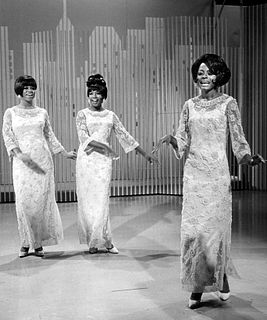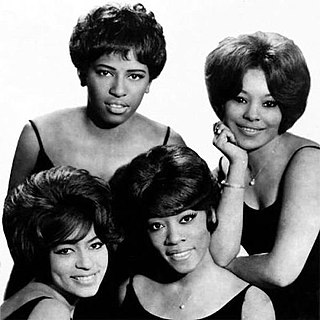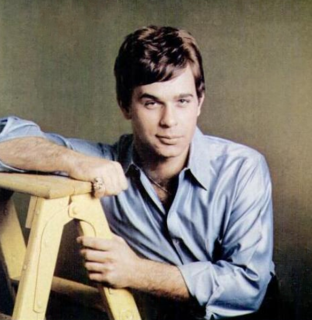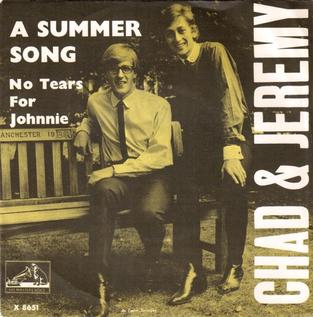Related Research Articles

The Supremes were an American female singing group and a premier act of Motown Records during the 1960s. Founded as The Primettes in Detroit, Michigan, in 1959, the Supremes were the most commercially successful of Motown's acts and are, to date, America's most successful vocal group with 12 number one singles on the Billboard Hot 100. Most of these hits were written and produced by Motown's main songwriting and production team, Holland–Dozier–Holland. At their peak in the mid-1960s, the Supremes rivaled the Beatles in worldwide popularity, and it is said that their success made it possible for future African American R&B and soul musicians to find mainstream success.

The Chiffons were an American girl group originating from the Bronx, a borough of New York City, in 1960.

Bert Kaempfert was a German orchestra leader, multi-instrumentalist, music producer, arranger, and composer. He made easy listening and jazz-oriented records and wrote the music for a number of well-known songs, including "Strangers in the Night" and "Moon Over Naples".
Pete Jolly was an American West Coast jazz pianist and accordionist. He was well known for his performance of television themes and various movie soundtracks.

The Lettermen are an American male pop vocal trio. The Lettermen's trademark is close-harmony pop songs with light arrangements. The group started in 1959. They have had two Top 10 singles, 16 Top 10 singles on the Adult Contemporary chart, 32 consecutive Billboard chart albums, 11 gold records, and five Grammy nominations.
"It Was a Very Good Year" is a song composed by Ervin Drake in 1961 and originally recorded by Bob Shane with the Kingston Trio.

Bob Dylan's Greatest Hits is a 1967 compilation album of songs by American singer-songwriter Bob Dylan. Released on March 27, 1967 by Columbia Records, in the non-productive period after Dylan's motorcycle accident in 1966, it was the first compilation album of material by Dylan. It contains every Top 40 single Dylan had up to 1967, plus additional tracks, including songs not released as singles by Dylan. It peaked at No. 10 on the pop album chart in the United States, and went to No. 3 on the album chart in the United Kingdom. Certified five times platinum by the RIAA, it is his best-selling album in the U.S.

Lugee Alfredo Giovanni Sacco, known professionally as Lou Christie, is an American soft rock singer-songwriter best known for several pop rock hits in the 1960s, including his 1966 number one hit "Lightnin' Strikes". John Lennon called Lou Christie one of Lennon's biggest influences.

"Help!" is a song by the English rock band the Beatles that served as the title song for the 1965 film and its soundtrack album. It was released as a single in July 1965, and was number one for three weeks in the United States and the United Kingdom.

The Sweet Inspirations were an American R&B girl group founded by Emily "Cissy" Houston, mother of Whitney Houston, and sister of Lee Warwick. Houston and Warwick were members of The Drinkard Singers, a family group that had the distinction of recording the first Gospel album to appear on a major label—a live recording from The Newport Jazz Festival in 1959. The line-up included Judy Guions, Marie Epps, Larry Drinkard, Nicholas Drinkard, Ann Moss, Lee and Emily.
"The Christmas Song" is a classic Christmas song written in 1945 by Robert Wells and Mel Tormé.
"Turn! Turn! Turn!", or "Turn! Turn! Turn! ", is a song written by Pete Seeger in the late 1950s and first recorded in 1959. The lyrics – except for the title, which is repeated throughout the song, and the final two lines – consist of the first eight verses of the third chapter of the biblical Book of Ecclesiastes. The song was originally released in 1962 as "To Everything There Is a Season" on folk group the Limeliters' album Folk Matinee, and then some months later on Seeger's own The Bitter and the Sweet.

"Get Together", also known as "Let's Get Together", is a song written in the mid-1960s by American singer-songwriter Chet Powers.

"Our Day Will Come" is a popular song composed by Mort Garson with lyrics by Bob Hilliard. It was recorded by American R&B group Ruby & the Romantics in early December 1962, reaching number one on the Billboard Hot 100.

"Where Have All the Flowers Gone?" is a modern folk-style song. The melody and the first three verses were written by Pete Seeger in 1955 and published in Sing Out! magazine. Additional verses were added in May 1960 by Joe Hickerson, who turned it into a circular song. Its rhetorical "where?" and meditation on death place the song in the ubi sunt tradition. In 2010, the New Statesman listed it as one of the "Top 20 Political Songs".
"Sweets for My Sweet" is a song written by the songwriting team of Doc Pomus and Mort Shuman, originally recorded by The Drifters.
"The Things We Did Last Summer" is a popular song about nostalgia from 1946. The words were written by Sammy Cahn, with the composition by Jule Styne. The most well known version is the 1946 Top ten hit by Jo Stafford. Versions by Frank Sinatra and by Vaughn Monroe also charted that year. Shelley Fabares had a hit cover in 1962 on the pop chart. Several recordings have been made, including versions by Frank Sinatra, Vaughn Monroe, and Dean Martin who recorded different versions for his 1959 and 1966 Christmas LPs.

"A Summer Song" is a 1964 song by the English pop music duo Chad & Jeremy. The song was written by duo partner Chad Stuart with Clive Metcalfe and Keith Noble.
"She Cried" is a song written by Ted Daryll and Greg Richards, and it was initially recorded by Ted Daryll in July 1961, but was a big hit when covered by Jay and the Americans for their 1962 album, She Cried. In 1962 the song reached number 5 on the Billboard Hot 100 and number 1 on WLS. The song was the group's first major hit.
"Our Winter Love" is an instrumental composition by Johnny Cowell, which was a hit single for Bill Pursell. Pursell's version was recorded in 1962, and was released as a single in January 1963.
References
- ↑ https://secondhandsongs.com/search?search_text=Sweet+September
- ↑ Pete Jolly Trio and Friends at AllMusic . Retrieved 13:24, 31 March 2015 (UTC).
- ↑ Sweet September at AllMusic . Retrieved 13:24, 31 March 2015 (UTC).
- ↑ Whitburn, Joel (2002). Top Adult Contemporary: 1961-2001. Record Research. p. 144.